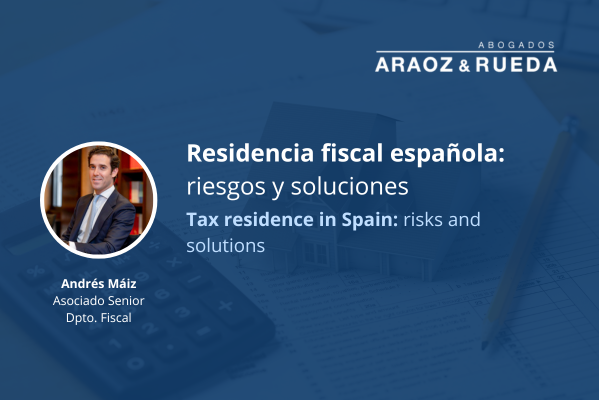In today’s increasingly globalized and internationally mobile environment, it is becoming more and more important to correctly determine the tax residence of individuals. There may be cases of individuals who are tax residents in Spain without being aware of it. This may be the case of Spanish individuals who go to live abroad but continue to maintain a link with Spain (i.e. expatriates); individuals who come to Spain to develop their business or professional activity (i.e. impatriates); artists or athletes who perform activities in Spain on a recurring basis; or the so-called digital nomads (i.e. international remote workers) who move their residence to Spain or spend long periods of time here.
The main impact of having tax resident status in Spain for an individual is that he is usually taxed under Personal Income Tax (“PIT”) on income earned worldwide, in accordance with the Spanish Personal Income Tax Law.
However, this is not the only tax risk related to the tax residence of individuals. There may be cases of double tax residence, where two countries claim tax residence for worldwide income of the same individual (to solve such conflicts it will be necessary to resort to the Convention for the Avoidance of Double International Taxation signed between Spain and the second State, if any,); or cases where a taxpayer may think that he has no tax residence in any jurisdiction. Likewise, in cases of international relocation, there are other taxes that must be taken into consideration, in particular, the so-called “Exit Tax”.
According to Spanish domestic regulations, an individual is considered to have his habitual residence in Spanish territory and, therefore, the status of tax resident in Spain when any of the following circumstances apply: (i) he spends more than 183 days, during the calendar year (i.e. January 1 to December 31), in Spanish territory; (ii) the main core or base of its economic activities or interests, directly or indirectly, is located in Spain.
To determine the period of permanence in Spanish territory, sporadic absences will be considered, unless the taxpayer proves his residence in another country. In order to determine if the base of activities or economic interests are in Spain, it will be necessary to take into account the total wealth and the total income.
Likewise, a taxpayer has his habitual residence in Spain when the spouse who is not legally separated and the minor children who depend on him habitually reside in Spain. In this sense, a circumstance that is usually taken into account by the Administration is the place where the minor children attend school; as well as the personal and family environment of the individual, sources of income or wealth, location of expenses).
Finally, if it is not possible to avoid staying in Spain for more than 183 days, a recommendable option may be to consider, prior to traveling to Spain, the application of the special regime applicable to workers, professionals, entrepreneurs and investors traveling to Spanish territory, also known as the impatriate regime or “Beckham Law”, which is more beneficial than the general regime.
At Araoz & Rueda Abogados we have a team of experts in international taxation that can help you analyze the risks related to tax residency and find safe and reasonable solutions for your case.
For more information:
Andrés Maíz | Senior Associate





